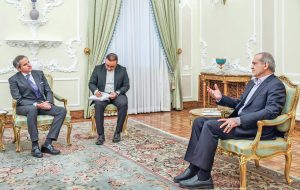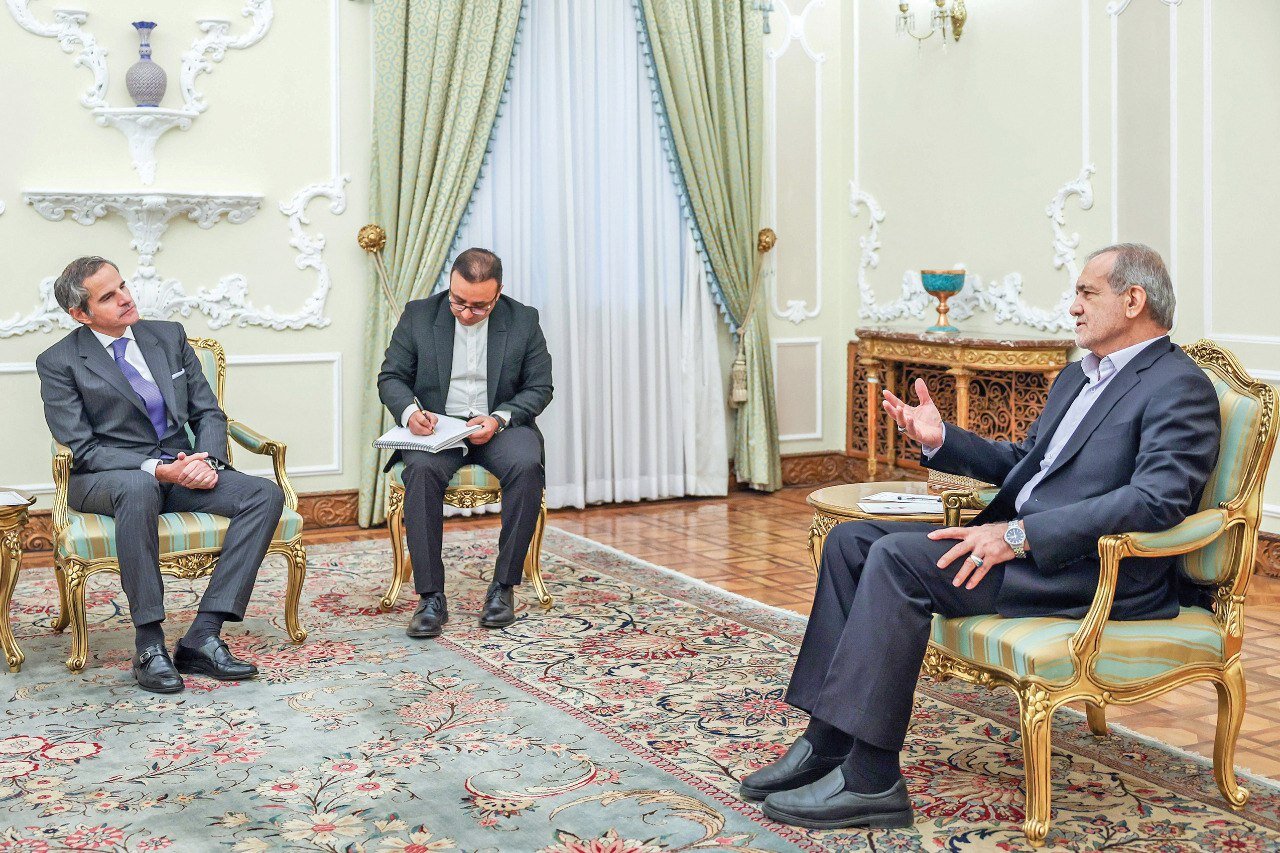‘Ball in West’s court’ – Tehran Times
TEHRAN – The International Atomic Energy Agency (IAEA) Director General Rafael Grossi’s visit to Tehran this week underscored Iran’s ongoing commitment to constructive dialogue over its nuclear program. During meetings with top Iranian officials, including President Masoud Pezeshkian and the head of the Atomic Energy Organization of Iran (AEOI), Mohammad Eslami, both sides stressed the


TEHRAN – The International Atomic Energy Agency (IAEA) Director General Rafael Grossi’s visit to Tehran this week underscored Iran’s ongoing commitment to constructive dialogue over its nuclear program.
During meetings with top Iranian officials, including President Masoud Pezeshkian and the head of the Atomic Energy Organization of Iran (AEOI), Mohammad Eslami, both sides stressed the importance of cooperation while addressing potential international tensions.
Grossi praised Iran’s willingness to maintain transparent relations with the agency, describing the discussions as “positive and constructive.”
He also expressed optimism that continued dialogue would strengthen collaboration and help neutralize external pressures on Iran’s nuclear activities.
Call for cooperation and interaction
At a joint press conference with Grossi, AEOI chief Mohammad Eslami emphasized that Iran remains ready to cooperate if the other parties approach the situation with goodwill. However, he warned of an “immediate response” to any resolution by the IAEA Board of Governors targeting Iran’s nuclear activities.
“Confrontation, resolution, and disruption will receive a reciprocal response,” Eslami stated, reaffirming Iran’s intention to advance its nuclear program in line with national interests and international regulations. His comments came amid reports that European powers are drafting a resolution to increase pressure on Tehran.
Iran’s President Pezeshkian echoed this sentiment, asserting the peaceful nature of the nation’s nuclear program during his meeting with Grossi. He cited a religious decree by Leader of the Islamic Revolution Ayatollah Seyyed Ali Khamenei prohibiting the development of nuclear weapons.
“We seek peace and security, and our actions align with international legal frameworks,” Pezeshkian said.
Commitment to NPT
After his own meeting with Grossi, Iranian Foreign Minister Abbas Araghchi reiterated Iran’s adherence to the Non-Proliferation Treaty (NPT), highlighting the nation’s consistent cooperation with the IAEA.
“We are willing to negotiate based on mutual respect and national rights, but we reject negotiations under pressure or intimidation,” Araghchi wrote on social media following his meeting with Grossi.
Araghchi emphasized that dialogue remains the best approach to resolving differences and expressed hope that the IAEA would adopt an independent, apolitical stance in its dealings with Iran.
Iran’s nuclear program has long been a focal point of Western scrutiny. The 2015 Joint Comprehensive Plan of Action (JCPOA) was initially lauded as a breakthrough in curbing potential nuclear proliferation while allowing Iran to benefit from the termination of sanctions. However, the U.S. withdrawal from the deal in 2018, followed by renewed sanctions, significantly strained diplomatic progress.
“Confrontation serves no one,” Araghchi noted. “It is only through constructive engagement that we can achieve sustainable solutions.”
Warnings against confrontation
While emphasizing Iran’s willingness to engage in cooperation, Eslami issued a stark warning about the consequences of confrontational measures during a subsequent interview with Iranian media.
He criticized external actors, including Israel, for attempting to derail Iran’s progress, and reiterated the country’s readiness to respond decisively to any aggression.
“Using worn-out tools and methods to pressure us will not succeed,” Eslami declared, reaffirming Iran’s resolve to continue its peaceful nuclear activities within the bounds of international law.
IAEA’s perspective
Grossi’s visit reflected the IAEA’s recognition of Iran’s efforts to maintain transparency and compliance with its international obligations.
“Good interaction and cooperation between Iran and the agency will neutralize any schemes against Iran’s nuclear activities,” Grossi remarked during one of his many high-ranking meetings.
Grossi toured Iran’s Fordow and Natanz nuclear enrichment facilities on Friday.
He was accompanied by Behrouz Kamalvandi, Deputy Head of the AEOI for International, Legal, and Parliamentary Affairs, as well as Kazem Gharibabadi, Iran’s Deputy Foreign Minister for Legal and International Affairs.
A path forward
As the IAEA Board of Governors prepares to convene, the future of Iran’s nuclear program remains at a crossroads. Tehran has consistently signaled its readiness for constructive engagement but expects reciprocal commitments from other parties.
President Pezeshkian summarized the stakes succinctly: “War benefits no one, but any aggression will be met with a decisive response. We are ready to cooperate, but the choice lies with others.”
The coming weeks will reveal whether Western powers will choose cooperation over confrontation, shaping the path for future diplomacy and stability in the region.
